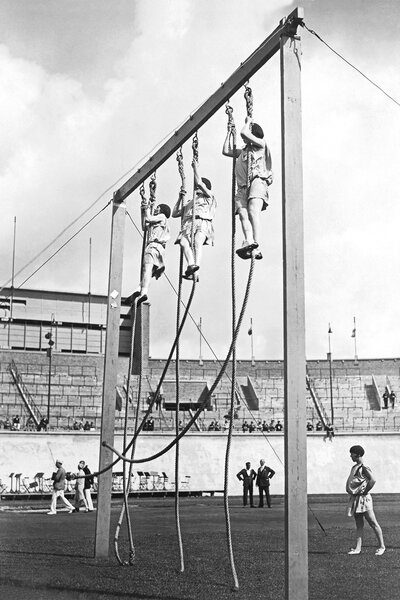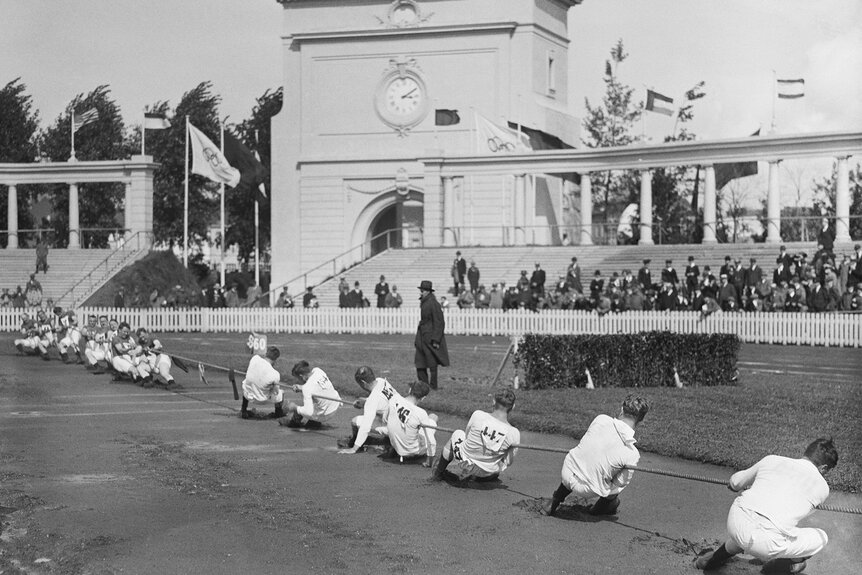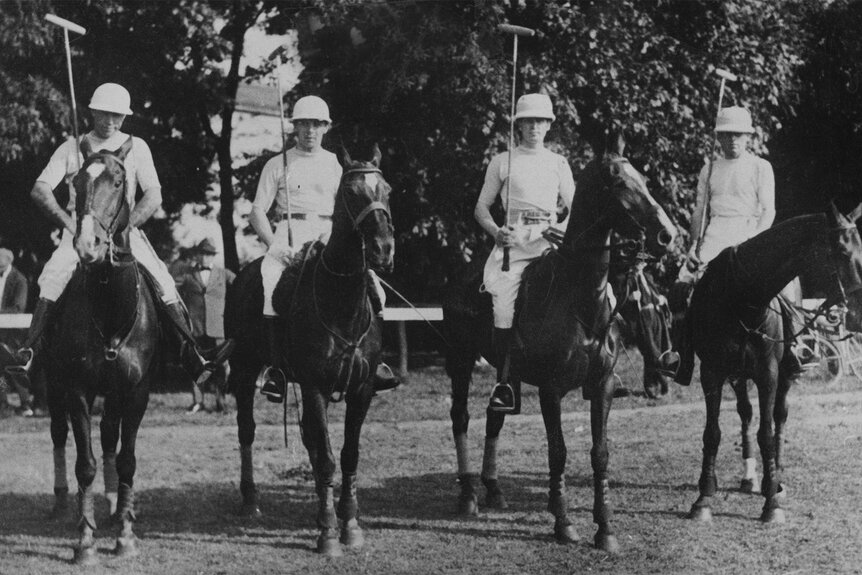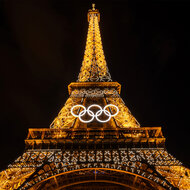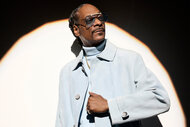Create a free profile to get unlimited access to exclusive show news, updates, and more!
Why Are Some Sports Removed from the Olympic Games? It's Complicated — Here's Why
Find out why some sports and some events failed to stick on the Olympic program throughout the years.
Believe it or not, tug-of-war was once an Olympic sport — at least until it was yanked from the lineup after the 1920 Summer Games.
Heading into the 2024 Paris Games, the lineup of the sporting events has evolved significantly over the 128-year history of the modern Olympics, particularly as the size and scale of the global audience watching the preeminent sporting competition in the world has grown.
At least nine other sports once played at the Summer Olympics have completely disappeared, but that number doesn’t include the dozens of demonstration sports like American football (St. Louis 1904 and Los Angeles 1932) and hot-air ballooning (Paris 1900) featured briefly only as concessions to their host countries.
That number also doesn’t include the scores of individual events within larger categories such as track and field, swimming, and gymnastics that have been discarded in favor of newer replacements.
RELATED: A Her-story of Women’s Gymnastics in the Olympic Games
“The Olympics are constantly evolving, it’s trial and error,” Bob Barney, professor emeritus at the University of Western Ontario and an Olympic historian told NBC Insider. “(The International Olympic Committee) will try something and if it works great, they will embrace it, they will refine it, they will carry it on. If it doesn’t work, well, back to the drawing board.”
Why have sports been added (or subtracted) from the olympics program?
The decision-making as to what sports are Olympic-worthy has been fairly subjective since the first modern installment, the 1896 Games in Athens, Greece.
“The whims of the IOC determine what's on the Olympic program and have been since 1896, when they claimed to draw inspiration from ancient Greek athletics yet added cycling, then a huge European craze, to the program,” Mark Dyreson, professor of kinesiology and history at Penn State University, said by email.
But in those early years, Olympics relied on large expositions such as World Fairs to stage, and so the programs were often subjected to the whims of the local organizers, said Dyreson. That’s how events like fishing tournaments and pigeon races made the cut.
Starting with the 1912 Games in Stockholm, Sweden, the IOC wrested more control over those decisions. By the 1970s, though, the IOC began to worry about “gigantism”: That there were too many sports given the time and logistics constraints.
“They began to come up with formulas — how popular was the sport, in how many nations was it practiced, how many tickets could it sell — about how to limit the program," added Dyreson. "TV and money also played a role, since they became that era the goose that produced the IOC's huge nest egg.”
Changes to the “sports programme” for an upcoming Olympics is determined by the IOC with a number of restrictions in place. Every sport must be governed by an international federation that is recognized by the IOC, and comply with both the Olympic Charter and the World Anti-Doping Code, says Barney.
Demonstration sports, competitions that are not official Olympic events, continue to be a way to test prospective sports with international appeal for potential inclusion in future Games, as well as showcase sports that are indigenous to the host country. At this year’s Paris Games, breaking (aka break-dancing), will make its debut. Flag football, a less violent version of American football, will be a demonstration sport at the 2028 Summer Games in Los Angeles.
“They put those five rings in front of them that represent the Americas, Africa, Europe, Asia, and Oceania (Australia), so they look for sports that represent all of those five rings as best as they can,” said Barney.
RELATED: See Team USA's Medal-Worthy Olympic Uniforms and Gear Ahead of the Summer Games
Just because a sport manages to make it onto an Olympic program doesn’t mean it will stay:
Why did globally popular sports like rugby, baseball, and cricket fail to score at Olympics?
Cricket is a sport that enjoys enormous popularity across the countries of the former British Empire, but the speed of the game and the difficulty to follow as a TV sport in most other markets have kept it out of the Olympics with the exception of the 1900 Games. The sport will return at the 2028 Los Angeles Games.
Baseball has grown from “America’s Pastime” to become a hit in Latin America and Asia over the decades, but still struggles getting Olympic respect. The sport was played at the Olympics from 1992 to 2008, and returned for the 2020 Tokyo Games, only to strike out again for Paris. Baseball will return with the 2028 Los Angeles Games, but clearly doesn’t have a secure berth. Women’s softball has followed a similar trajectory, having been on the program from 1996 through 2012, then back briefly in 2020, and on the docket for a return for the 2028 Games.
Rugby emerged alongside association soccer — better known to Americans as soccer — in the same era as the formation of the Modern Olympics and men’s rugby was included in four Olympics, until it was dropped after the 1924 Paris Games. The sport, championed by upper-class students at the British universities, didn’t have the same universal appeal as soccer, which caught on with the working class around the world.
Then it returned with the 2016 Summer Games in Rio — albeit in a different, faster-paced format. Rugby-7 features fewer players clogging up the field (seven compared to fifteen) and quicker games, with 14-minute matches compared to the standard 80-minute matches.
“Rugby disappeared until the twenty-first century, when it came back not as the classical version but as the telegenic new version of rugby-7's,” sayd Dyerson. “Here, money and television's brilliant images shaped the IOC, which more than anything else craves the world's largest TV audience.
“It was perceived as far better TV than lacrosse, or, even worse, baseball and softball, or even worse on TV for non-fans, cricket.”
RELATED: Those About to Die: Did the Ancient Romans Invent the Olympic Games?
Then there are the sports whose disappearances are less of a surprise:
Discontinued Olympic Sports
Track and field, gymnastics, and swimming have had a fair amount of turnover in the included events over the years. Solo synchronized swimming lasted for three Summer Olympics (1984 to 1992) before organizers recognized that it’s a lot more impressive visually to synchronize with a team. Obstacle swimming, which involved competitors scrambling over poles and swimming over boats, lasted just one Olympics, the 1900 Paris Games, running into the insurmountable barrier of low popularity.
A “running deer” shooting event, which involved an inanimate moving target shaped like the animal, went extinct after being an Olympic event from 1908 through 1948.
Individual sports categories have also come and gone. Polo may be known as, "The Sport of Kings," but it has failed to stick with a broader audience after five appearances at the Olympics between 1900 and 1936. It was added to the list of recognized sports by the IOC in 1996, so there’s always the chance that it could someday return.
Croquet had the dubious distinction of drawing one spectator during its one stint as an Olympic sport. That appearance 1900 Paris Games did feature the first women competitors in any Olympic event. A similar ball and mallet sport called roque debuted at the 1904 St. Louis Games and was never seen again.
Motorboating stalled after just one official appearance, during the 1908 London Games, in part because spectators couldn’t watch the races off the coast of Southhampton, and six of the nine events were cancelled because of bad weather, according to Top End Sports.
Several sports made Olympic debuts only to be dismissed too niche for organizers tastes, including pelota (1900), lacrosse (1904 and 1908), and Jeu de Paume (1908).
As of tug of war, it lasted on the program for five Olympics, from 1900 through 1920, but it never was able to pull away from its image as an unskilled and uncouth “picnic sport” for ruffians rather than true athletes.
“(IOC co-founder) Baron de Coubertin was aghast at their inclusion, because in fact they were not an ancient Greek event but, in his view, merely the grubby pastime of medieval peasants,” said Dyreson. “He was ecstatic when the track and field body dropped then after 1920.”




